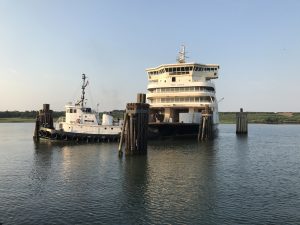
OCEAN CITY — A 320-foot ferry boat, mothballed since 2013 after it was retired from the Cape May-Lewes Ferry fleet, will become part of a growing artificial reef system off the mid-Atlantic coast easily accessible from Ocean City.
The Delaware River and Bay Authority (DRBA) announced this week the ferry boat MV Twin Capes will be sold to the Delaware Department of Natural Resources and Environmental Control (DNREC) and eventually sunk as an artificial reef about 26 miles offshore in a reef site known as Del-Jersey-Land because it is equidistant from the Indian River Inlet in Delaware, Cape May in New Jersey and the Ocean City Inlet. The artificial reef site is about 26 miles southeast of the Indian River Inlet.
The MV Twin Capes was one of the three original ferries built in 1974 for the Cape May-Lewes Ferry, which has shuttled an estimated 45 million visitors back and forth between the two ports since its inception in 1964, including countless visitors to Ocean City and the Delaware beach resorts from destinations further north. The MV Twin Capes had a capacity to carry 895 people and 100 vehicles.
The MV Twin Capes was declared surplus property in 2010 after reaching its life expectancy with the Cape May-Lewes Ferry and was drydocked in 2013.
The older and larger MV Twin Capes was also significantly more costly to operate than her sister ships. It required 17 crewmembers to operate, or about 50 percent more than the other ferries in the fleet, and burned 126 gallons of fuel per hour, or about 25 percent more than her sister ships.
For more than five years, the DRBA actively sought a buyer for the retired MV Twin Capes before an agreement was reached with DNREC to add it to the growing artificial reef site off the mid-Atlantic coast including Maryland, Delaware and New Jersey where it will eventually create recreational opportunities for boaters, anglers and divers. DNREC’s contractor, Coleen Marine in Virginia Beach, paid the DRBA $200,000 this week to take possession of the MV Twin Capes and will begin the process of making it suitable for an artificial reef contribution. The anticipated sinking date on the Del-Jersey-Land Reef is sometime in 2018.
“We’re pleased to be able to partner with DNREC on this worthwhile environmental project,” said Cape May-Lewes Ferry Operations Director Heath Gehrke. “During the sale process, it was apparent that the market was thin for such a specialized vessel. For us, it made sense to partner with DNREC on this artificial reef project to benefit the divers and sportsfishermen of Delaware, New Jersey and Maryland.”
DNREC Secretary Shawn Garvin said the MV Twin Capes will provide a rich and spacious habitat for numerous fish species and enhance recreational fishing and diving off the mid-Atlantic coast.
“The Twin Capes is one of the finest reefing candidates DNREC has ever seen, and as an artificial reef, it will be unparalleled as a fish habitat and a spectacular dive for exploration,” he said. “Adding the Twin Capes to Delaware’s artificial reef system is another investment in Delaware’s conservation economy by DNREC that also brings a trove of environmental benefits.”
The MV Twin Capes will become the latest and most significant contribution to the Del-Jersey-Land artificial reef site just about 30 miles from the Ocean City Inlet. In 2011, the U.S.S. Arthur W. Radford, a 536-foot retired U.S. Navy destroyer, was sunk at the Del-Jersey-Land site and quickly became teeming with sea life and serving its intended purpose as a vast artificial reef system.

